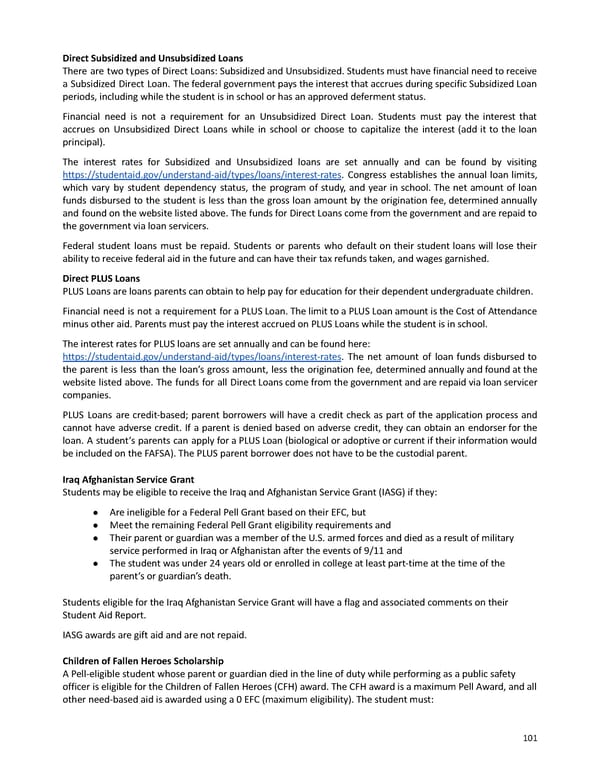Direct Subsidized and Unsubsidized Loans There are two types of Direct Loans: Subsidized and Unsubsidized. Students must have financial need to receive a Subsidized Direct Loan. The federal government pays the interest that accrues during specific Subsidized Loan periods, including while the student is in school or has an approved deferment status. Financial need is not a requirement for an Unsubsidized Direct Loan. Students must pay the interest that accrues on Unsubsidized Direct Loans while in school or choose to capitalize the interest (add it to the loan principal). The interest rates for Subsidized and Unsubsidized loans are set annually and can be found by visiting https://studentaid.gov/understand-aid/types/loans/interest-rates. Congress establishes the annual loan limits, which vary by student dependency status, the program of study, and year in school. The net amount of loan funds disbursed to the student is less than the gross loan amount by the origination fee, determined annually and foundonthewebsitelistedabove.ThefundsforDirectLoanscomefromthegovernmentandarerepaidto thegovernmentvialoanservicers. Federal student loans must be repaid. Students or parents who default on their student loans will lose their ability to receive federal aid in the future and can have their tax refunds taken, and wages garnished. Direct PLUS Loans PLUSLoansareloansparentscanobtaintohelppayforeducationfortheirdependentundergraduatechildren. Financial need is not a requirement for a PLUS Loan. The limit to a PLUS Loan amount is the Cost of Attendance minusotheraid.ParentsmustpaytheinterestaccruedonPLUSLoanswhilethestudentisinschool. Theinterest rates for PLUS loans are set annually and can be found here: https://studentaid.gov/understand-aid/types/loans/interest-rates. The net amount of loan funds disbursed to the parent is less than the loan’s gross amount, less the origination fee, determined annually and found at the website listed above. The funds for all Direct Loans come from the government and are repaid via loan servicer companies. PLUS Loans are credit-based; parent borrowers will have a credit check as part of the application process and cannot have adverse credit. If a parent is denied based on adverse credit, they can obtain an endorser for the loan. A student’s parents can apply for a PLUS Loan (biological or adoptive or current if their information would beincludedontheFAFSA).ThePLUSparentborrowerdoesnothavetobethecustodialparent. Iraq Afghanistan Service Grant Students maybeeligible to receive the Iraq and Afghanistan Service Grant (IASG) if they: ● AreineligibleforaFederalPellGrant basedontheirEFC,but ● MeettheremainingFederalPellGranteligibilityrequirementsand ● TheirparentorguardianwasamemberoftheU.S.armedforcesanddiedasaresultofmilitary service performed in Iraq or Afghanistan after the events of 9/11 and ● Thestudentwasunder24yearsoldorenrolledincollegeatleastpart-timeatthetimeofthe parent’s or guardian’s death. Students eligible for the Iraq Afghanistan Service Grant will have a flag and associated comments on their StudentAidReport. IASGawardsaregiftaidandarenotrepaid. Children of Fallen Heroes Scholarship APell-eligible student whose parent or guardian died in the line of duty while performing as a public safety officer is eligible for the Children of Fallen Heroes (CFH) award. The CFH award is a maximum Pell Award, and all other need-basedaidisawardedusinga0EFC(maximumeligibility).Thestudentmust: 101
 2023-2024 | Catalog Page 100 Page 102
2023-2024 | Catalog Page 100 Page 102